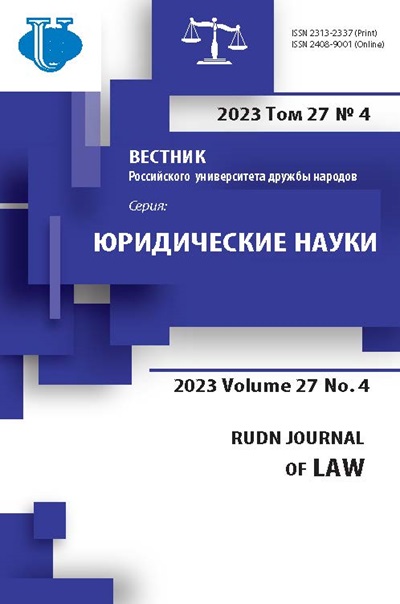Transforming Digital Dispute Resolution in India
- Authors: Gronic I.A.1
-
Affiliations:
- RUDN University
- Issue: Vol 27, No 4 (2023)
- Pages: 1113-1124
- Section: JUSTICE IN RUSSIA AND FOREIGN COUNTRIES
- URL: https://journals.rudn.ru/law/article/view/36906
- DOI: https://doi.org/10.22363/2313-2337-2023-27-4-1113-1124
- EDN: https://elibrary.ru/OYIRCY
- ID: 36906
Cite item
Full Text
Abstract
The era of digital reality offers and shapes new dispute resolution mechanisms, imposes high demands and sets its own rules to be complied with. The introduction of information and communication technologies and artificial intelligence into judicial and out-of-court dispute resolution proceedings in India has shown innovative results quite rapidly. Transformation of digital modes of dispute resolution continues with new research and development of modern technologies that strive for excellence. The purpose of this study is to analyze transformation of digital dispute resolution methods in India, considering the historical evolutionism that led from the Vedic era to the global digital revolution, formation of a hybrid model that combines several modes of dispute resolution - offline courts, online courts and online dispute resolution using digital technologies and alternative dispute resolution methods. However, the digital system is far from being perfect; it has significant drawbacks associated with the risks of cyber-attacks and leakage of personal data containing sensitive confidential and personal information. Besides, the digital literacy of the Indian population located on the periphery is quite low, which greatly reduces the level of trust in electronic courts and online dispute resolution.
About the authors
Irina A. Gronic
RUDN University
Author for correspondence.
Email: gronik_i@pfur.ru
ORCID iD: 0000-0003-0893-5655
Candidate of Legal Sciences, Associate Professor of the Department of Civil Law and Procedural Law and Private International Law, Law Institute
6 Miklukho-Maklaya str., Moscow, 117198, Russian FederationReferences
- Agrawal, P. (2021) Virtual Court System in India: An Experiment. Available at: SSRN. 4090127. http://dx.doi.org/10.2139/ssrn.4090127
- Bashilov, B.I. & Berman, A.M. (2022) Procedural documents in the era of new technologies: how legal design has changed the legal world. Smart Innovation, Systems and Technologies. (288), 261-270. https://doi.org/10.1007/978-981-16-9808-8_28
- Ermakova, E.P. (2016) To a question about the concept of forms and methods of dispute resolution in the different legal systems. Gaps in Russian legislation. (6), 55-58. (in Russian).
- Ermakova, E.P. & Frolova, E.E. (2022) Using Artificial Intelligence in Dispute Resolution. In: Inshakova, A.O. & Frolova, E.E. (eds.). Smart Technologies for the Digitisation of Industry: Entrepreneurial Environment. Smart Innovation, Systems and Technologies. Vol. 254. Springer, Singapore. pp. 131-142. https://doi.org/10.1007/978-981-16-4621-8_11
- Ermakova, E.P. & Frolova, E.E. (2022) Using artificial intelligence in dispute resolution. Smart Innovation, Systems and Technologies. (254), 131-142. https://doi.org/10.1007/978-981-16-4621-8_11
- Frolova, E.E. & Rusakova, E.P. (2022) Development of digital technologies for dispute resolution of economic entities as a means of increasing economic stability. Advances in Research on Russian Business and Management. (2022), 65-73.
- Gronic, I.A. (2022) On some aspects of case management in electronic courts of Indonesia. Smart Innovation, Systems and Technologies. (288), 193-199. https://doi.org/10.1007/978-981-16-9808-8_21
- Kudryavtseva, E.V. (2021) Look from the past and present at the future of civil procedural legislation. Zakony Rossii: opyt, analiz, praktika. (9), 10-13. (in Russian).
- Kuznetsov, M.N. (2020) The influence of digitalization on some guiding principles of civil proceedings. Bulletin of the Moscow State Pedagogical University. Series: Legal sciences. 2(38), 58-67. doi: 10.25688/2076-9113.2020.38.2.06. (in Russian).
- Nedungadi, P.P., Menon, R., Gutjahr, G., Erickson, L. & Raman, R. (2018) Towards an inclusive digital literacy framework for digital India. Education + Training. 60(6), 516-528. https://doi.org/10.1108/ET-03-2018-0061.
- Pandey, A.K. (2023) Access to Justice through Virtual Courts in Current Indian Scenario. South Asian Law & Economics Review. (8), 33-44. https://doi.org/10.55662/SALER.2023.801
- Rusakova, E.P., Frolova, E.E., Zankovsky, S.S. & Kupchina, E.V. (2019) Problems of implementation of leadership in dispute resolution of the BRICS countries (on the examples of the Russian Federation, China, India). In: 6th International Conference on Education, Social Sciences and Humanities. Istanbul, 24-26 june 2019. Istanbul, OCERINT. pp. 754-759.
- Rusakova, E. P. (2020) The digital agenda of civil litigation in India. In: Comparative Legal Aspects of Legal Relations of Civil Circulation in the Modern World: Collection of Articles of the International Scientific Legal Forum in Memory of Professor V.K. Puchinsky, Moscow, 16th October 2020. Moscow, RUDN University. pp. 257-261. (in Russian).
- Rusakova, E. P., Frolova, E.E. & Inshakova, A.O. (2021) The Procedure of Mediation in the Age of Industry 4.0. In: Popkova, E.G. & Sergi, B.S. (eds.). Modern Global Economic System: Evolutional Development vs. Revolutionary Leap. ISC 2019. Lecture Notes in Networks and Systems. Vol. 198. Cham: Springer Nature. pp. 947-953. https://doi.org/10.1007/978-3-030-69415-9_105
- Rusakova, E.P., Gronik, I.A. & Kupchina, E.V. (2022) Digital justice in the countries of the Asia-Pacific region. Moscow, Peoples' Friendship University of Russia (RUDN University). (in Russian).
- Zakharkina, A. & Kuznetsova, O. (2021) Foreign civil doctrine of smart contracts. In: SHS Web of Conferences: 14th Session of Euro-Asian Law Congress “The value of law” 2021, Ekaterinburg. Vol. 134. Ekaterinburg, EDP Sciences Publ. pp. 00016. https://doi.org/10.1051/shsconf/202213400016
Supplementary files















